“It’s hard and it’s painful because I saw these explosions with my own eyes,” said Silvia*, a mother from Odesa, sitting outside among tall, leafy trees in the late summer at a holiday camp in Moldova that had been repurposed as refugee accommodation.
For the first month of the conflict, Silvia and her family watched what was happening to Mariupol and feared that Odesa would be next. “It’s very frightening. I panicked constantly,” Silvia said. In early April she left, driving for hours with three of her children aged six, eight and 16 to reach Moldova. “I realised that I needed to flee because I might not have another chance."
After reaching the border, the family received help from multiple organisations and finally knew they were safe. But Silvia soon realised that all was not well. Her 16-year-old son stopped going outside and barely spoke, and her six-year-old daughter who used to draw flowers now only drew tanks and warplanes. Silvia too had “a heavy burden on my heart.”
Plan International funded a mobile mental health support team called Pidtrymka (‘support’ in Ukrainian) to work at a number of refugee accommodation centres, including Silvia’s. During their time at the camp, the team has supported the family through both group and individual sessions.
“I started talking with them and I felt better,” said Silvia. “I started smiling. I started doing sports. I started taking care of my children. I am very glad.” She also said that the sessions helped her overcome a sense of shame from having to ask for help from others and allowed her instead to celebrate the kindness and empathy being extended to her family.
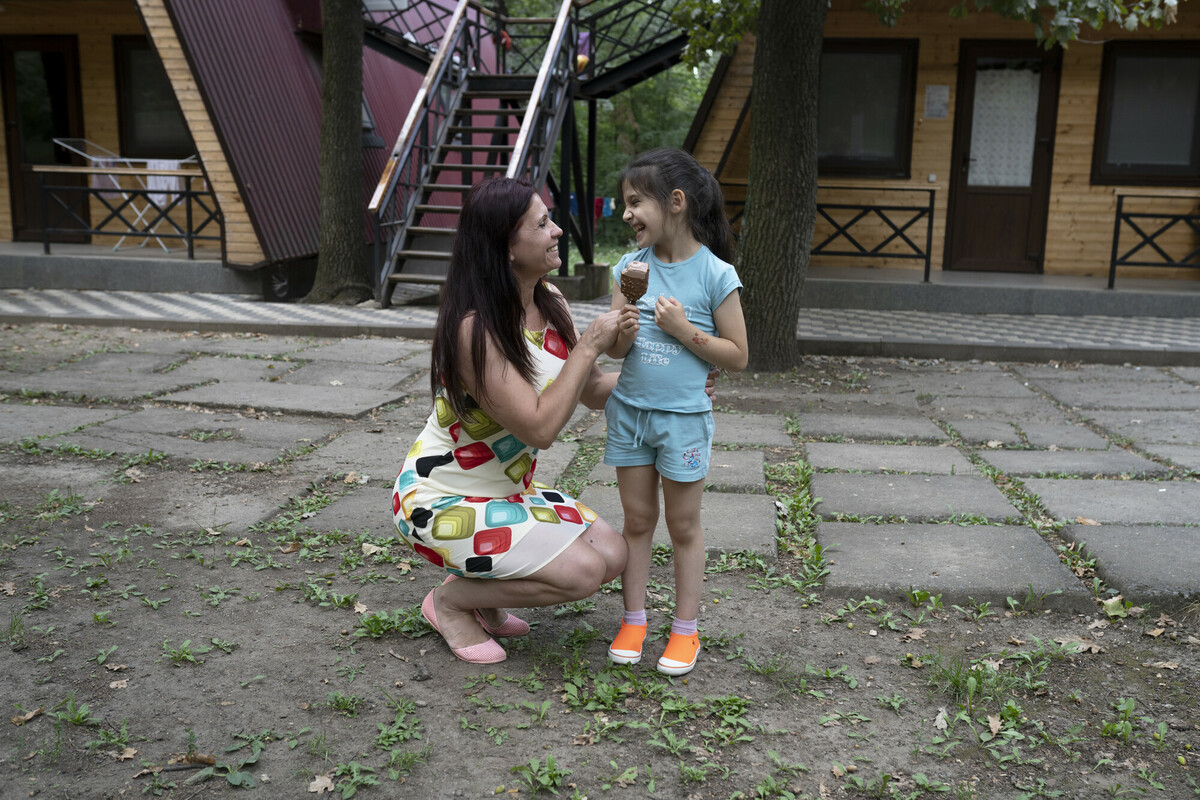
Her children’s mental health rapidly improved too. Her son started socialising and playing football with other teenagers and her daughter started drawing flowers again. Silvia said the children enjoyed the sessions, asking which day Pidtrympka were coming back. “It's like a balm for the soul,” Silvia said of the sessions.
While people from Ukraine have shown incredible resilience in the face of the conflict, many are carrying its mental and emotional scars. Many have experienced shelling or air strikes and had terrifying journeys to safety. Some have had their homes destroyed. Some are grieving the deaths of friends or loved ones. Huge numbers are desperately worried about family members who have stayed behind or been conscripted into the military.
Sarah Hilding der Weduwen, head of the UN humanitarian organisation UN OCHA in Ukraine, says the mental health impact has been felt across the whole of Ukrainian society. “It’s a collective, national trauma which is going to be very hard to work through once the conflict is over.”
“Many of the people have seen such deep trauma with their own eyes, especially the children,” says Mariya Tuzyk, project co-ordinator for Posmishka UA, a charity supporting children and families that is based in the west of Ukraine and is funded by DEC charity Concern Worldwide.
Despite the scale of mental and emotional suffering, the low availability and social acceptance of mental health support within Ukraine has meant that charities have faced cultural barriers in getting people to seek or accept help. Even Silvia, who is now a firm advocate for mental health support was wary of seeking help at first. “I never thought I’d be able to talk to a psychologist,” she said.
“It’s not normal in our culture for people to even go to psychologists to admit that you need some assistance,” says Viktoriya Gora from Caritas Odesa, a partner of CAFOD and Oxfam. “But the moment they do make this step, you realise how much need there is. All of the psychologists employed at Caritas are working day and night.”
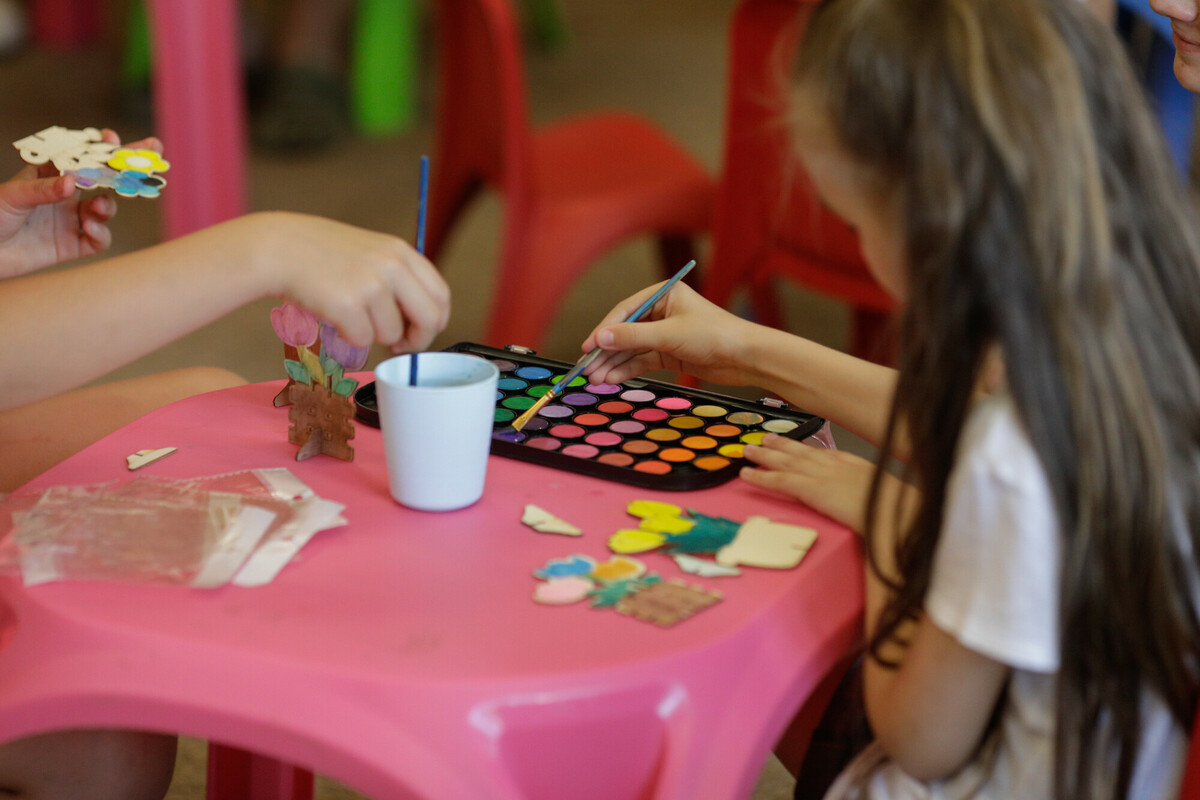
The Jesuit Refugee Service (JRS), a local partner of CAFOD in Romania, which offers counselling sessions with a psychologist funded by the DEC, say they have seen a change in attitudes since the summer. Whereas in the first six months people did not acknowledge they might need psycho-social support, gradually more people have been open to help.
“Many people [were] reluctant in coming to individual sessions,” says Bianca Albu who is project manager at JRS in Bucharest, “saying ‘I don't have the time to go to a psychologist or therapy’ and so on. Now, having done the group sessions, many refugees want individual sessions going forward.” JRS has now provided counselling to over 200 people with demand still high.
The conflict’s impact on children has been particularly severe, even for those who have not shown immediate signs of needing help. Andrei Craciun, area manager for Suceava and Iasi at Save the Children Romania in the north-east of the country, says: “What we’ve seen is that somewhere around maybe three or four months after they started settling in Romania, some families started reporting behaviours, or signs, especially with their children of stress for the trauma they’ve been through.”
Many charities have used play as a form of therapy for children, providing child-friendly spaces or ‘kids corners’ in Romania and Moldova to ensure that children could play together and take part in outdoor activities and excursions. In Hungary, DEC funds supported summer camps for children, providing fun activities for them as well as some respite for parents.
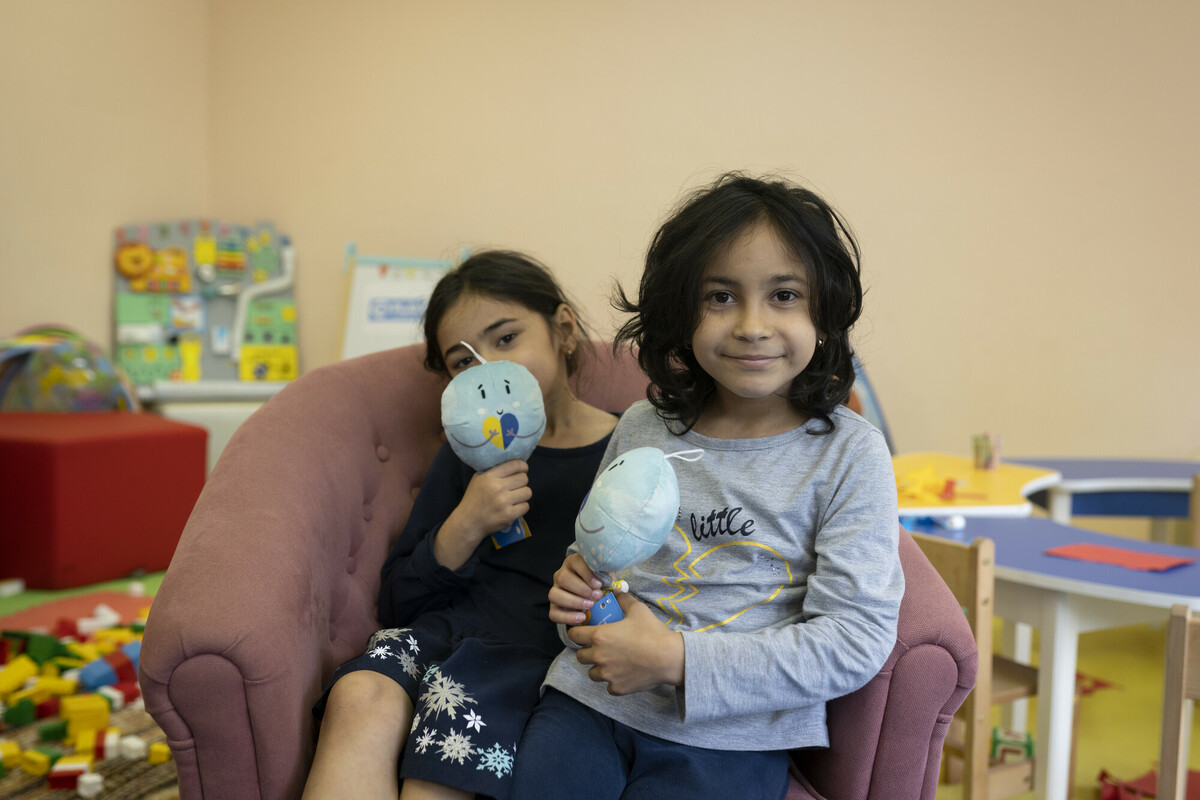
In Moldova, Pridtympka, the organisation that helped Silvia, have distributed ‘Trympka’ toys, using them as transitional objects for children to take care of and talk to. They have been a big hit with the children and staff have found children more outgoing and less defensive as a result. What’s more, the toy comes with a booklet attached with information for parents on how to access specialist services, stay safe and seek help. By August the organisation had given out the toys to 3,500 families.
Inside Ukraine, DEC charities have combined mental health support with other kinds of assistance to make it easier for people to access help. Save the Children is working with a local partner to fund social workers to go into communities affected by the conflict, providing psychosocial support alongside other essential items.
Olha* and her seven children live near Chernihiv, not far from the border with Belarus, and endured months of heavy shelling. Last summer their house burnt down after a short-circuit started a fire. With two hours of electricity a day and one phone between them, life is hard, and Olha values the visits by the social workers.
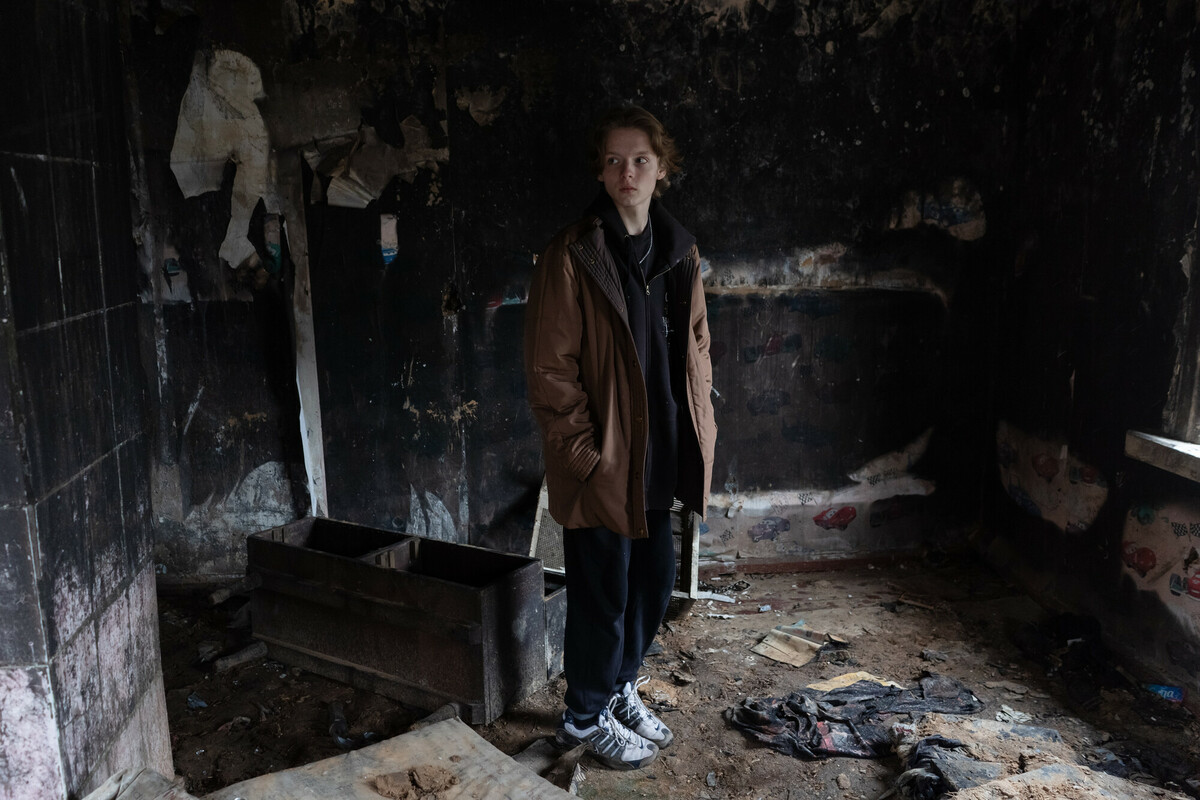
“They help with everything: clothes, food, you can talk with them. If there’s a problem, we talk and it becomes easier,” she said in November. “When they come, the mood is better. They don’t leave us behind.”
Action Against Hunger set up a mobile health facility for displaced people in the car park of a shopping centre in Zaporizhzhia, a waypoint for many people fleeing active conflict zones in the east. The facility allows people to access mental health services alongside medical treatment and supplies.
The conflict affects different groups in different ways, and psychological assistance is tailored accordingly by DEC charities and partners.
Daniele Pedretti, the humanitarian manager for HelpAge in Moldova, a partner of Age International, says older refugees have particular psychological issues – feelings of guilt for leaving the country, for instance, or extreme concern for their grown-up children who stayed behind. “Their only thought is to go back, everything for them here is temporary,” Pedretti says. “They are not really interested in integrating.”
HelpAge provides psychosocial support in small group sessions once a week in seven of the residential centres it runs in Moldova. Although the DEC did not directly fund the provision of psychosocial support, Pedretti says the DEC was essential as it gave them the opportunity to be operating in many centres by funding the food and distribution programme. While there, Help Age was able to identify people in need of psychological support.
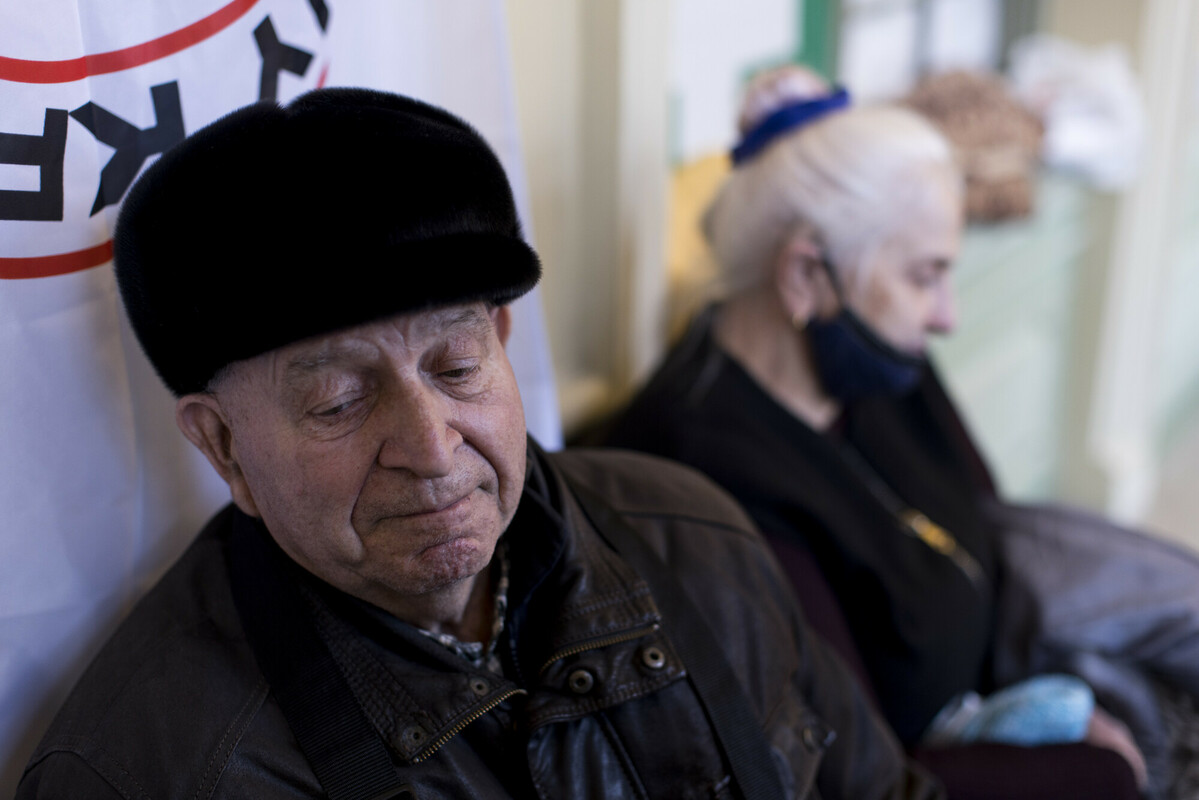
SPHERE Ukraine, a partner of ActionAid, is a queer and feminist organisation which runs a mental health support programme with different layers. The organisation concentrates on people in the east of the country where there is most need.
One activity is a group chat [on a smartphone], where therapists and counsellors answer questions and help people to adapt and cope with the current situation. They also have weekly group calls, with separate chats for women and for the LGBTQ+ community. SPHERE also offer to reimburse the costs of ongoing therapy for those who were getting support before the conflict but now lack the funds to continue.
Ruslana Hnatchenko, SPHERE’s Fundraising Manager, says: “Mental health is very important these days and a lot of people are struggling, especially people from vulnerable groups. So mental health is a priority for us.”
Aid workers too have been affected, especially local staff. The psychological strain of navigating the risks involved in working in a conflict zone where long-range strikes are common takes its toll. “I start my mornings checking if every one of my team members is alive – not OK, but alive,” says Yulia Sporysh, CEO of NGO Girls, a partner of ActionAid, which works in six regions of Ukraine specialising in reaching small villages. Staff working in refugee host countries also report the mental health impact of seeing so many people in distress on a regular basis. DEC charities and their partners have a duty of care to staff and volunteers and have been providing support where needed.
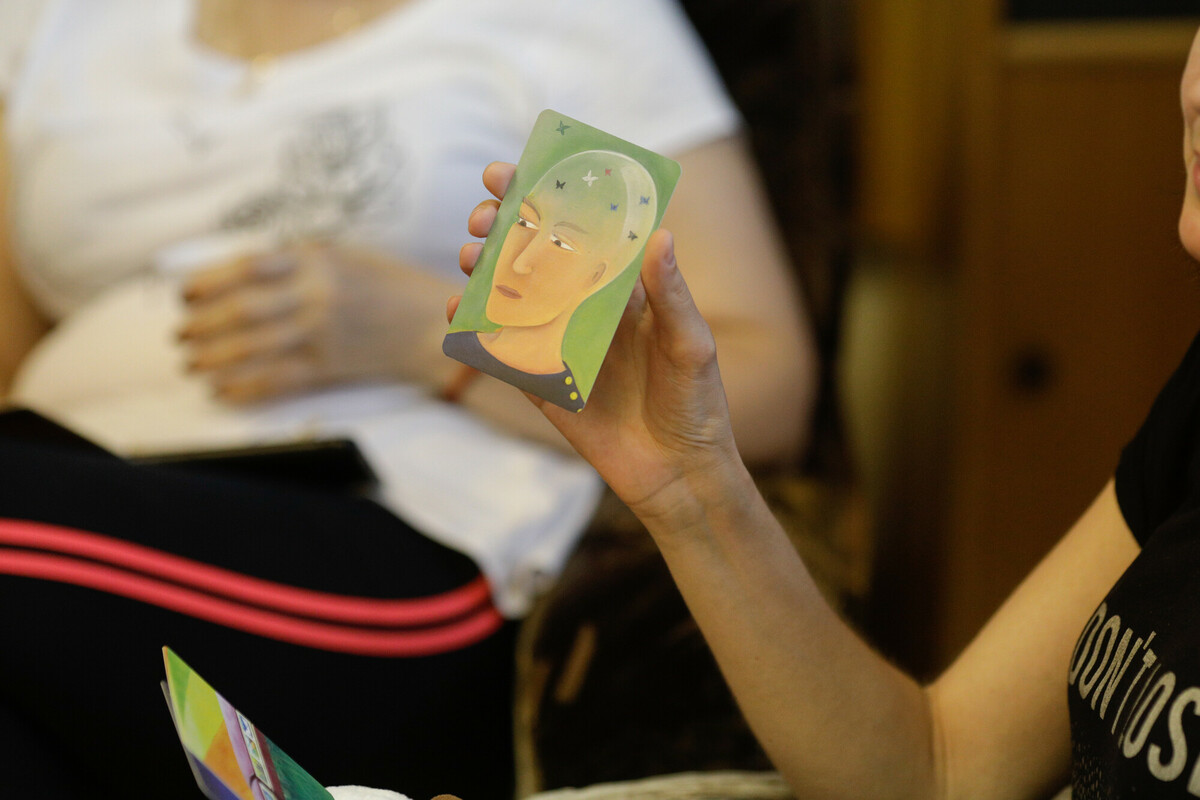
As the conflict, violence and uncertainty drag on, people’s mental health continues to deteriorate. People being displaced now tend to have seen more of the conflict than those who fled early on and are even more in need of support.
“The trauma that people are experiencing is just beyond our understanding, and it will be with us for generations to come,” says Mariya Tuzyk of Pomishka UA. “An enormous amount of psychosocial support is needed and we will have to deal with everything that everybody as a nation is experiencing.”
Marysia Zapasnik, International Rescue Committee Ukraine Country Director agrees: “It's dealing with the emotional and mental trauma at an individual level, family level, community level, and also country level. This has been a huge trauma for everyone in Ukraine. That's something that takes a long time to process to deal with to heal and to then be able to cope and rebuild.”
But one source of strength for people affected by the conflict often cite is the knowledge that help is coming to them from the UK and around the world, reminding them that they are not alone, not forgotten.
“I have a message to the people of Great Britain,” says Marina, a refugee who works as a psychologist with Plan International partner CNPAC. “Thank you, because it is their donations and solidarity which helped us to feel better, me and all the refugees from Ukraine.”
*Names changed to protect identities.